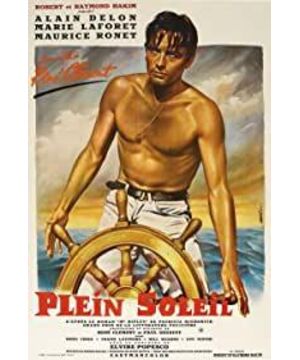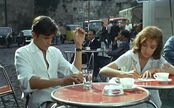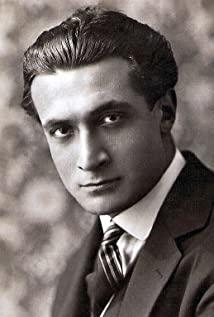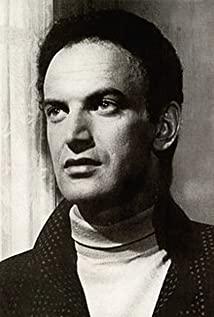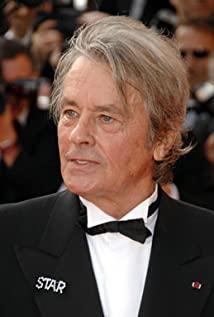He traveled thousands of miles and suffered humiliation for just a handful of banknotes. He looked for food everywhere like a sparrow, but didn't know that he was actually a peacock. Until the rich family he admired was killed, he began to have birdlings. One, one, the rich family who died in his hands became covered feathers, and they were hung on their tails as trophies and swaggered. He identified with the self in the mirror, and he was able to sit on an equal footing with those he had looked up. His name is Tom Ripley, and he is an arrogant. He wanted to escape from the low-rent buildings in Lower New York, from the vulgar voices around him, from his own body. He is a snake, desperately maintaining his dignity, crawling towards the upper class. He seizes every opportunity to shed his skin and wants to get rid of the smell of low-rent buildings. He didn't like the embarrassment that came out of his own bones, he was fanatical infatuated with those who were comfortable in their actions. He killed the men he liked, and at that moment he felt that he was them. He killed people to get rid of the self he hated, and he didn't know that all he got rid of was the shed old skin. He never dared to look back at the skin he had shed, but squirmed away and went to climb Gaozhi again. His name is Tom Ripley, and he is a loathsome.
They are both Ripley, born out of the same mother, from the same class, and are equally unknown. The opportunity for them to know themselves is murder. Their fork in the road is the psychological change after killing. The former Ripley killed someone and embraced the hot sun, while the latter killed someone and hid in a more humid tree hole. They have very different endgames. The best-selling novel "The Genius Ripley" was adapted in the hands of two generations and has two appearances. At the end of "The Dead in the Wrath", Ripley squinted on the recliner, with the Mediterranean sun on his head, boastingly stretched his body, and the glass was filled with the best wine in the tavern. There were more detectives in the store, and he didn't notice it. Hearing someone calling him, he got up and responded, showing instinctive daze. After walking a few steps hesitantly, there was a calm smile on his face out of thin air, as if he was about to receive a silly boy from his wife. Thinking of good things, he walked briskly to paint, and walked towards the late trial.
The author of "Genius Ripley" has publicly stated that she does not agree with the ending of "The Sinking Dead". Later generations of film critics also criticized this. Judging movies with the inertia of literary thinking, ignoring its unique media vocabulary-radical arguments are always easy to be echoed by the public. The movie stays in the scene after Ripley's departure: the sun, the blue sea, the reef, the sailboat... it seems that nothing happened. The unoccupied scenes form a supplementary psychology in visual perception. At this moment, all people think about is Ripley who is out of the picture, and what is imprinted in his mind is his style-a brilliant smile, grab tomorrow In the palm of your hand.
Some commentators disagree with the ending of "The Sinking Dead", saying that Ripley should not be allowed to defy the law. In fact, during the movie time, Ripley didn't fall behind. At the level of story information, it only explained that Ripley went to the tavern with detectives, but did not clearly indicate that Ripley would be able to defeat the law. As for whether he would get out of the way or get out of the game, it is possible outside the movie time. At the end, the following information was given successively: The Maggie sailed out of the water-Philip's body was found-the police came to Ripley. At this moment Ripley was enjoying the sun without realizing it. Such parallel processing emphasizes Ripley's "unknowing". In contrast, the audience witnessed everything from beginning to end. This is the difference in perspective between outsiders and insiders, which forms the strength of the trial—the audience's condescending trial of serial murderers. Secondly, given the limitations of being a person, using the difference in perspective, I asked a question-how does Ripley think about his behavior and situation after repeated murders? Due to the limited perspective, his cognition is bound to be framed, thereby generating cognition independent of the audience's experience, leaving room for thinking.
Ripley got Maggie, like a trophy after a murder, he enjoyed Maggie, and enjoyed the sunny sky behind Maggie. Audiences who understand everything will judge with common sense and ethics-Ripley is at large, and the wicked win. In fact, Ripley lying in the sun is just boasting about his comfort, just like students who have taken a perfect score showing their test papers everywhere. In other words, he believes that everything he deserves at the moment, he has earned it with hard work and cleverness. Only when you have peace of mind can you have that comfort. Such an end, even if the detective arrived, he could not touch the corner of his clothes. The calmness of the final painting was the biggest reward he got. At that time, the eyes looking out of the painting should be defined as the "victory" of the common people. Good days are waiting for me. Think so.
In addition to the irony of Ripley's "unknowing", the author deliberately created an audience with omniscience present, and through omniscience established the possibility of the audience sympathizing with the murderer. Ripley was a murderer, but he was the victim first. He was deceived by Philip, lightly insulted by Freddy, and despised by Maggie. He had a father-and-brother adoration of Philip, and at the same time he was arrogant and provocative. In the beginning, he was a little joke, deceived, banished (nearly lost his life), and finally forced to buy, his murderous intentions grew a little bit. In the beginning, Ripley just wanted to take Philip home and pay for the business. Later, he found out that Philip had been playing tricks, so he started to stay behind and stole Philip's bank statement. Even here, Ripley still had expectations of Philip. After getting on the boat, the two of them were squeezed into an extreme space facing each other, with no way out. Philip had the advantage at the beginning: the ship belonged to him, and the ship’s name was Maggie; the people belonged to him, and he declared the status of the captain; it was also his decision whether to return to the United States. When Philip discovered that the statement was stolen, his sense of superiority was mixed with a sense of crisis. He wanted to tease Ripley to confess, so as to regain his sense of control. In fact, Ripley originally only used this as a backup plan. Once Philip broke through, his psychology was strengthened instead. The crime was named in the sun, the language of provocation, the crime was predicted, and his malice began to grow. In the end, there were only two men left. He made a move and the other side hacked it until Philip was desperate and said that he was going to throw the typewriter-at this time Ripley had to do it-otherwise he would get nothing. The confrontation section on the ship seems to be a gambling on money, but in reality it is a gambling on life. The murderous intent hidden under the provocation of the two people's chat, laughter and provocation, is very bloody. In the end Ripley refused to be bought by Philip, because he had mastered the hole card-the knife in his hand. The mentality changes from the trespasser to the murderer, and the progressive crescendoing process allows the audience to fully experience the brewing of killing intent.
Philip's attitude towards Ripley is to treat him as a follower and plaything. He exiled Ripley, the punishment was overdone, and his reaction was subtle at this time. Of course he can't admit his regrets, but rather swear words in front of his lover-I hardly recognize him. Perhaps, he has no regrets at all. He has an attitude of "depending on how well you can play" towards Ripley, and even constantly presses Ripley how to use his identity to commit fraud. The game-like sense of duel teases Ripley's criminal desire.
Philip gradually looked at Gao Ripley, but when he realized the danger, he couldn't get out. At this time, he showed the ruthlessness of the rich family, provoking Ripley to tell the crime plan against him, and at the same time proposing ways to resolve it. Like a blind chess game, Philip used all his might to tease Ripley's moves, and then fought back with fighting spirit.
Philip's contribution to a thousand dollars is a brilliant pen for this dramatic passage. Compared with Ripley, Philip is the habitual offender. He is used to deceiving people: to Maggie, to the lady on the street, to Ripley, and even to his father. He uses lies to exploit everyone around him. He has the capital to exploit-he can always be forgiven by everyone. He even deceived Maggie to say that he hardly recognized Ripley-which was obviously a lie, because he had told Freddy privately-that they hadn't seen each other for almost five years. It was so fussy after five years of not seeing him, which shows that he was still an acquaintance before.
Therefore, when Philip finally came out, he was still habitually deceiving people. He bought Ripley in a deceitful way. His unyielding nature harmed him. Ripley rejected this kind of exploitative exploits. He wanted a fair confrontation and he rejected Philip grandly.
Some commented that Philip had crushed Ripley's dignity. In fact, Leip's use of earrings to make a game is tantamount to abandoning dignity. What evokes Ripley's killing intent is not the dignity scandal, but that he can no longer bear this kind of natural deception and exploitation. Philip has everything, and he still wants to exploit Ripley's five thousand dollars in reward. Philip had obviously agreed to go back to the United States with Ripley to meet his father, but he betrayed his promise lightly. When confronted with questioning, Philip's posture seemed as if he had never heard of such things. In Philip's eyes, no one can maintain dignity, and he tramples on promises at will. Ripley refused to be exploited. As early as when Philip Ming said that he would not return to the United States, Ripley began to retaliate, first deliberately shaking the boat when they were affectionate; after being punished by Philip, he escalated his revenge and set earrings. . This series of actions are motivated by revenge, not a natural malicious drive. Therefore, Ripley of Rene Clements does not bear the moral judgment of the audience-the man killed is worse than him, even though he is personable.
From beginning to end, Ripley did not really enjoy Philip's money-he did not kill for money, but to enjoy a sense of arrogance. He wanted Maggie because of the pleasure of arrogance. Taking control of Maggie made him truly feel that he was on par with Philip. Prior to this, Ripley was "playing" Philip in secret. When Philip and Maggie were making each other after a long-awaited reunion, Ripley slipped into Philip's bedroom, put on his full outfit, looked into the mirror, and followed his tone of voice. It's a pity that René Clement only gave him half a sentence before Philip bumped into this presumptuous scene, and Ripley's stolen pride was shattered. The embarrassment of this arrest is pitiful Ripley. The "narcissistic" time stolen in this scene is so short that it makes people feel sympathetic. This narcissistic self-satisfaction can be imprinted in our memory precisely because of its shortness. It was a moment that belonged only to Ripley, even though the image in the mirror was not "self." It looks like when we were young, we imitated the knights in the costume drama-put on the sheets, and pulled out the broken plastic sword in the mirror. At that moment, we knew that we could not become the illusion in the costume drama, but we were still intoxicated with the other "self" played by ourselves.
Ripley was exhausted and committed crimes one after another in order to cover up the crimes. He switched between his and Philip's identities embarrassingly, without a moment's life. Until the end, he got Maggie. At that time, he at the beach was probably the most comfortable time in his life-he was being "self" and no longer needed a mirror, and everyone around him would become the mirror that reflected him. When he was called to "answer the phone", the smile at the corner of his mouth revealed unprecedented confidence.
Compared to "The Dead in the Wrath", "Genius Ripley" explains everything too clearly. Including Ripley's life situation and how he got an errand, which is equivalent to putting a figure on a glass slide and looking at textures under a microscope. "The Dead in the Wrath" did not explain where Ripley came from. At the beginning, he had reached a tacit agreement with Philip-it was he who made the rich man escape from his serious lover. He came out for the purpose of Provide entertainment for Philip. If placed in the traditional setting of comedy opera, Ripley is Philip's clever manservant, who makes his master's life no longer boring. "The Genius Ripley" is much more boring. The textbook-like plots are laid out and the characters never show charm. All behaviors are explained for the purpose of explanation. The essay illustrates Ripley’s criminal path. At first glance It is simply a high-cost legal column drama. Only in one place, "Genius Ripley" can be regarded as giving us some room for thinking, which is a hidden matter hidden under the plot chain.
"Genius Ripley" has done too much effort in the beginning and the turn of the plot, to the point where it is tiresome, so hard is to convey a kind of criticism. Ripley met Philip's father on an upper-class occasion in the United States. He yearned for the class above his head so much that he falsified his academic identity. He got an errand from the conservative upper class, but his destination was the cradle of the Renaissance, a utopia of true freedom and liberation. In Italy, Ripley's liberating nature allowed him to face his sexuality, and had close contact with two men with charms on their faces. Sadly, when he met the daughter of the American chaebol again, he did not hesitate to grasp the clinging vines, and decisively killed his lover, and he tied himself to the gatepost of conservative upper class again. He thought he was moving forward, but he didn't know that it was his own tail that was biting him. He was just a gluttonous snake spinning in place.
Also adapted from the movie, "The Dead in the Wrath" shows the side of the sun. Ripley has nothing to do before and does nothing. He embraces the sun unscrupulously. His unconsciousness is even full of the beauty of power. "Above" has a revolutionary hot temperature, and murder can give people a sense of uprightness. It is my favorite crime movie to date. "Genius Ripley" gave the dark side. He was swallowed up by all the details, and even his musical taste could not break through the bourgeois arty. His self-loath had no temperature, and all that was left was the friction of snake crawling. , His unawareness does not belong to him, but a tool used by the author to curse the world.
For details, please refer to the WX official account, please search for: "Half a catty eight two-year-old movie", thank you for your attention and communication!
View more about Purple Noon reviews


